World Trade Organization: Roles, Criticisms, and Doha Round
VerifiedAdded on 2023/01/18
|9
|1899
|30
Essay
AI Summary
This essay provides a comprehensive analysis of the World Trade Organization (WTO), examining its core roles in regulating international trade, facilitating negotiations, and administering trade policies. It delves into the WTO's functions, including its role in dispute resolution and cooperation with international institutions like the IMF. The essay critically evaluates the criticisms leveled against the WTO, such as its perceived bias towards developed countries, its impact on cultural diversity, and its handling of environmental concerns. Furthermore, it explores the progress and challenges of the Doha Development Round, discussing its objectives, the issues it addresses, and its overall impact on global trade liberalization. The essay concludes by summarizing the key arguments and offering insights into the WTO's effectiveness and areas for improvement, drawing upon relevant data and examples to support its claims.
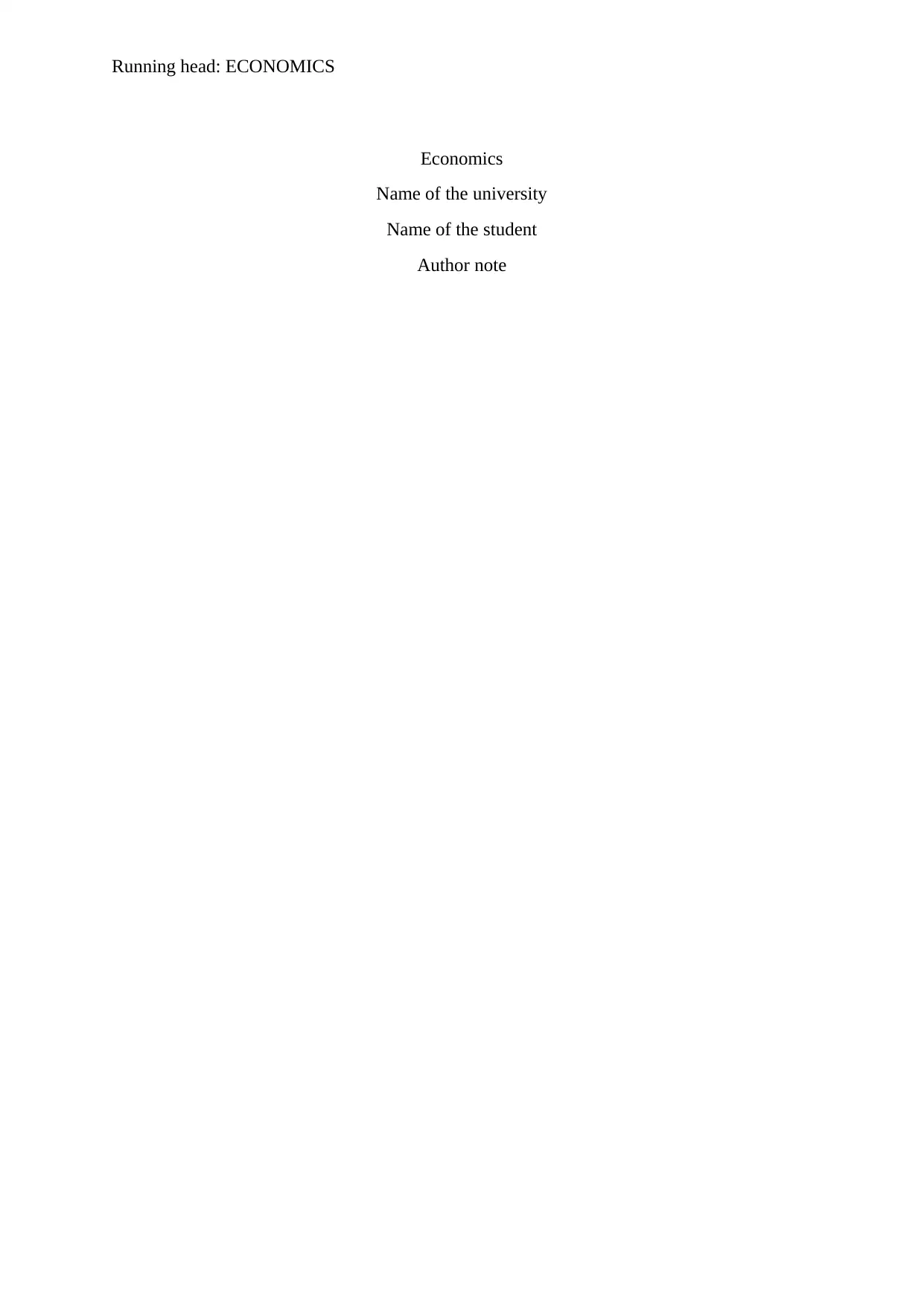
Running head: ECONOMICS
Economics
Name of the university
Name of the student
Author note
Economics
Name of the university
Name of the student
Author note
Paraphrase This Document
Need a fresh take? Get an instant paraphrase of this document with our AI Paraphraser
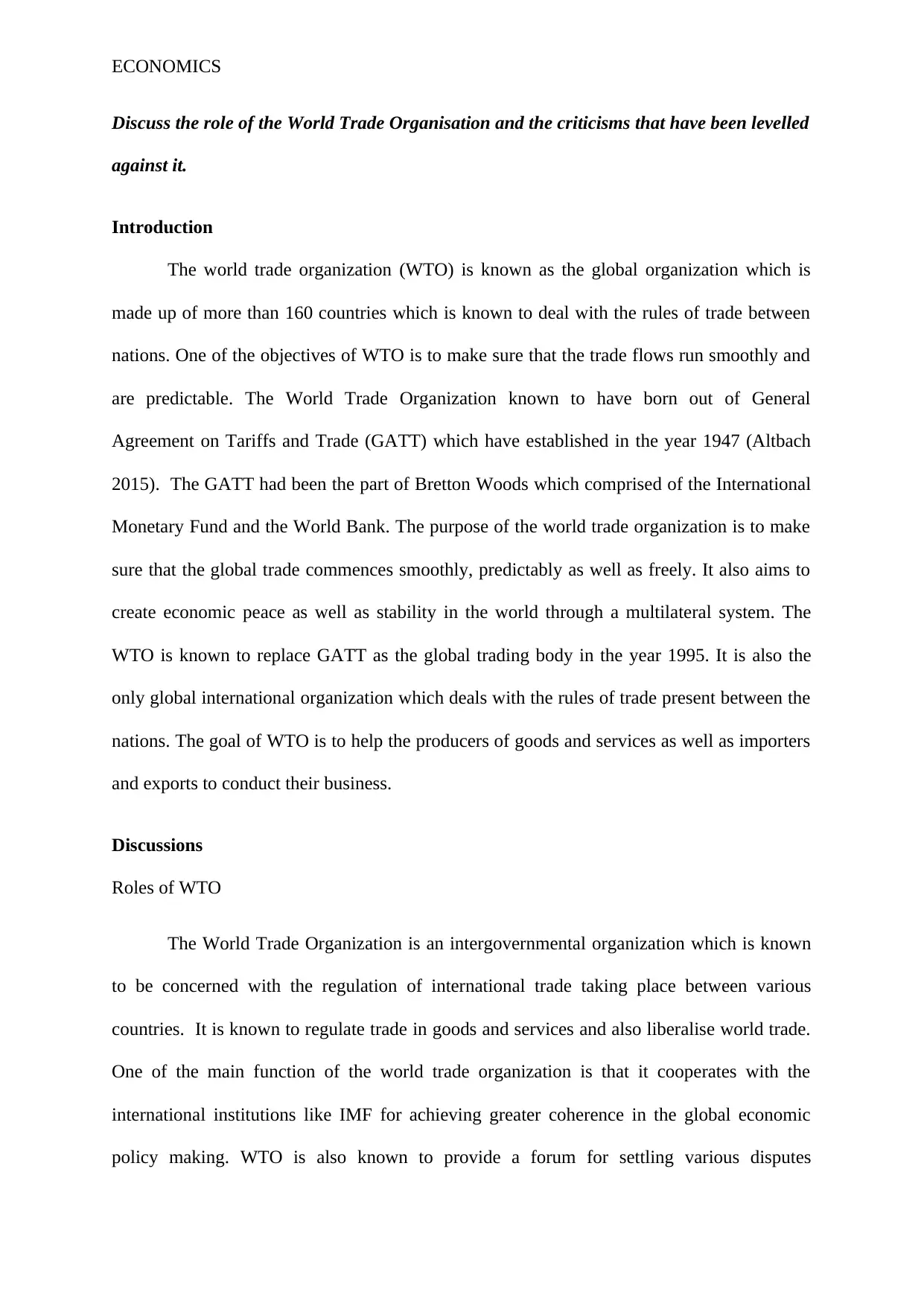
ECONOMICS
Discuss the role of the World Trade Organisation and the criticisms that have been levelled
against it.
Introduction
The world trade organization (WTO) is known as the global organization which is
made up of more than 160 countries which is known to deal with the rules of trade between
nations. One of the objectives of WTO is to make sure that the trade flows run smoothly and
are predictable. The World Trade Organization known to have born out of General
Agreement on Tariffs and Trade (GATT) which have established in the year 1947 (Altbach
2015). The GATT had been the part of Bretton Woods which comprised of the International
Monetary Fund and the World Bank. The purpose of the world trade organization is to make
sure that the global trade commences smoothly, predictably as well as freely. It also aims to
create economic peace as well as stability in the world through a multilateral system. The
WTO is known to replace GATT as the global trading body in the year 1995. It is also the
only global international organization which deals with the rules of trade present between the
nations. The goal of WTO is to help the producers of goods and services as well as importers
and exports to conduct their business.
Discussions
Roles of WTO
The World Trade Organization is an intergovernmental organization which is known
to be concerned with the regulation of international trade taking place between various
countries. It is known to regulate trade in goods and services and also liberalise world trade.
One of the main function of the world trade organization is that it cooperates with the
international institutions like IMF for achieving greater coherence in the global economic
policy making. WTO is also known to provide a forum for settling various disputes
Discuss the role of the World Trade Organisation and the criticisms that have been levelled
against it.
Introduction
The world trade organization (WTO) is known as the global organization which is
made up of more than 160 countries which is known to deal with the rules of trade between
nations. One of the objectives of WTO is to make sure that the trade flows run smoothly and
are predictable. The World Trade Organization known to have born out of General
Agreement on Tariffs and Trade (GATT) which have established in the year 1947 (Altbach
2015). The GATT had been the part of Bretton Woods which comprised of the International
Monetary Fund and the World Bank. The purpose of the world trade organization is to make
sure that the global trade commences smoothly, predictably as well as freely. It also aims to
create economic peace as well as stability in the world through a multilateral system. The
WTO is known to replace GATT as the global trading body in the year 1995. It is also the
only global international organization which deals with the rules of trade present between the
nations. The goal of WTO is to help the producers of goods and services as well as importers
and exports to conduct their business.
Discussions
Roles of WTO
The World Trade Organization is an intergovernmental organization which is known
to be concerned with the regulation of international trade taking place between various
countries. It is known to regulate trade in goods and services and also liberalise world trade.
One of the main function of the world trade organization is that it cooperates with the
international institutions like IMF for achieving greater coherence in the global economic
policy making. WTO is also known to provide a forum for settling various disputes
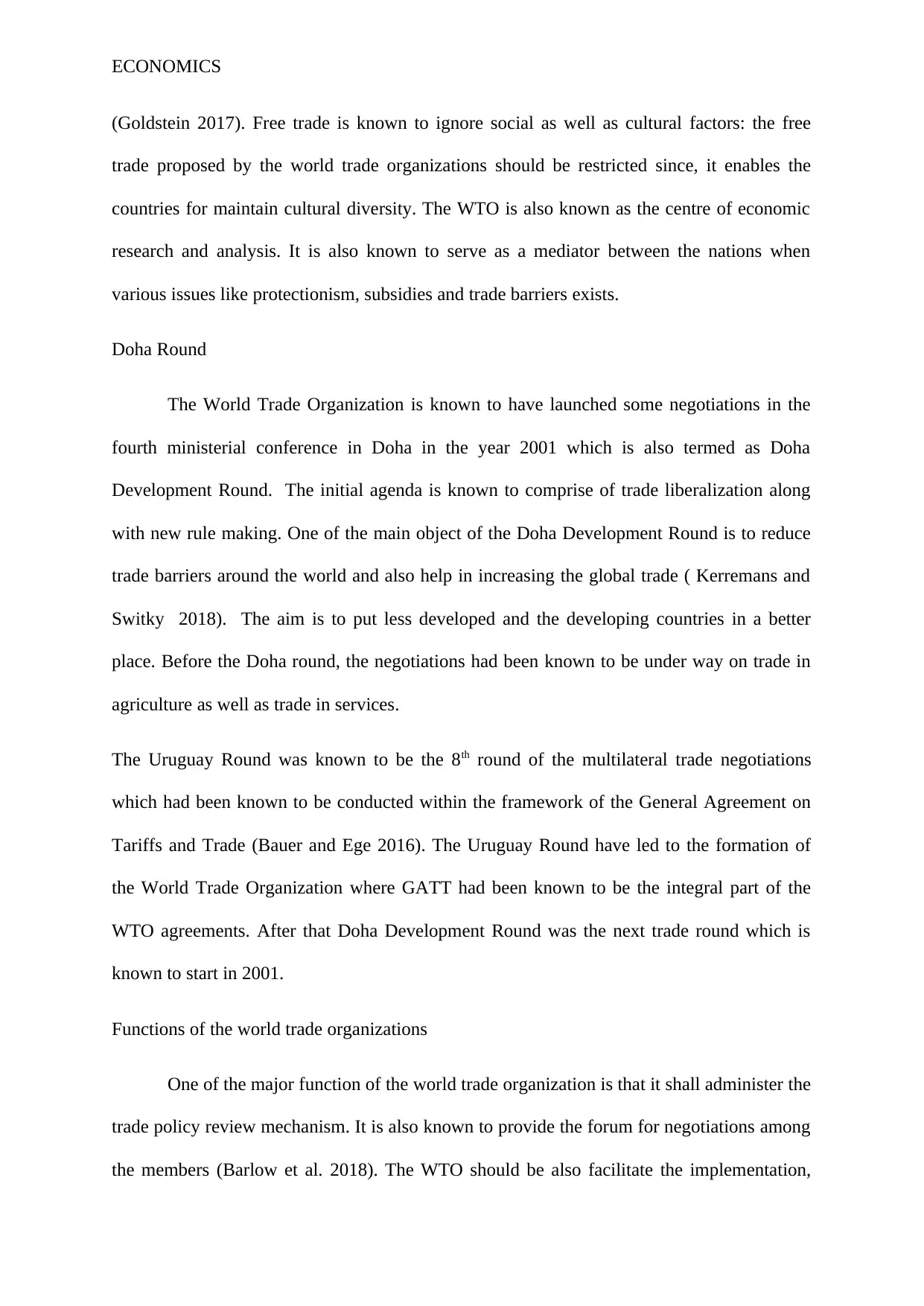
ECONOMICS
(Goldstein 2017). Free trade is known to ignore social as well as cultural factors: the free
trade proposed by the world trade organizations should be restricted since, it enables the
countries for maintain cultural diversity. The WTO is also known as the centre of economic
research and analysis. It is also known to serve as a mediator between the nations when
various issues like protectionism, subsidies and trade barriers exists.
Doha Round
The World Trade Organization is known to have launched some negotiations in the
fourth ministerial conference in Doha in the year 2001 which is also termed as Doha
Development Round. The initial agenda is known to comprise of trade liberalization along
with new rule making. One of the main object of the Doha Development Round is to reduce
trade barriers around the world and also help in increasing the global trade ( Kerremans and
Switky 2018). The aim is to put less developed and the developing countries in a better
place. Before the Doha round, the negotiations had been known to be under way on trade in
agriculture as well as trade in services.
The Uruguay Round was known to be the 8th round of the multilateral trade negotiations
which had been known to be conducted within the framework of the General Agreement on
Tariffs and Trade (Bauer and Ege 2016). The Uruguay Round have led to the formation of
the World Trade Organization where GATT had been known to be the integral part of the
WTO agreements. After that Doha Development Round was the next trade round which is
known to start in 2001.
Functions of the world trade organizations
One of the major function of the world trade organization is that it shall administer the
trade policy review mechanism. It is also known to provide the forum for negotiations among
the members (Barlow et al. 2018). The WTO should be also facilitate the implementation,
(Goldstein 2017). Free trade is known to ignore social as well as cultural factors: the free
trade proposed by the world trade organizations should be restricted since, it enables the
countries for maintain cultural diversity. The WTO is also known as the centre of economic
research and analysis. It is also known to serve as a mediator between the nations when
various issues like protectionism, subsidies and trade barriers exists.
Doha Round
The World Trade Organization is known to have launched some negotiations in the
fourth ministerial conference in Doha in the year 2001 which is also termed as Doha
Development Round. The initial agenda is known to comprise of trade liberalization along
with new rule making. One of the main object of the Doha Development Round is to reduce
trade barriers around the world and also help in increasing the global trade ( Kerremans and
Switky 2018). The aim is to put less developed and the developing countries in a better
place. Before the Doha round, the negotiations had been known to be under way on trade in
agriculture as well as trade in services.
The Uruguay Round was known to be the 8th round of the multilateral trade negotiations
which had been known to be conducted within the framework of the General Agreement on
Tariffs and Trade (Bauer and Ege 2016). The Uruguay Round have led to the formation of
the World Trade Organization where GATT had been known to be the integral part of the
WTO agreements. After that Doha Development Round was the next trade round which is
known to start in 2001.
Functions of the world trade organizations
One of the major function of the world trade organization is that it shall administer the
trade policy review mechanism. It is also known to provide the forum for negotiations among
the members (Barlow et al. 2018). The WTO should be also facilitate the implementation,
⊘ This is a preview!⊘
Do you want full access?
Subscribe today to unlock all pages.

Trusted by 1+ million students worldwide
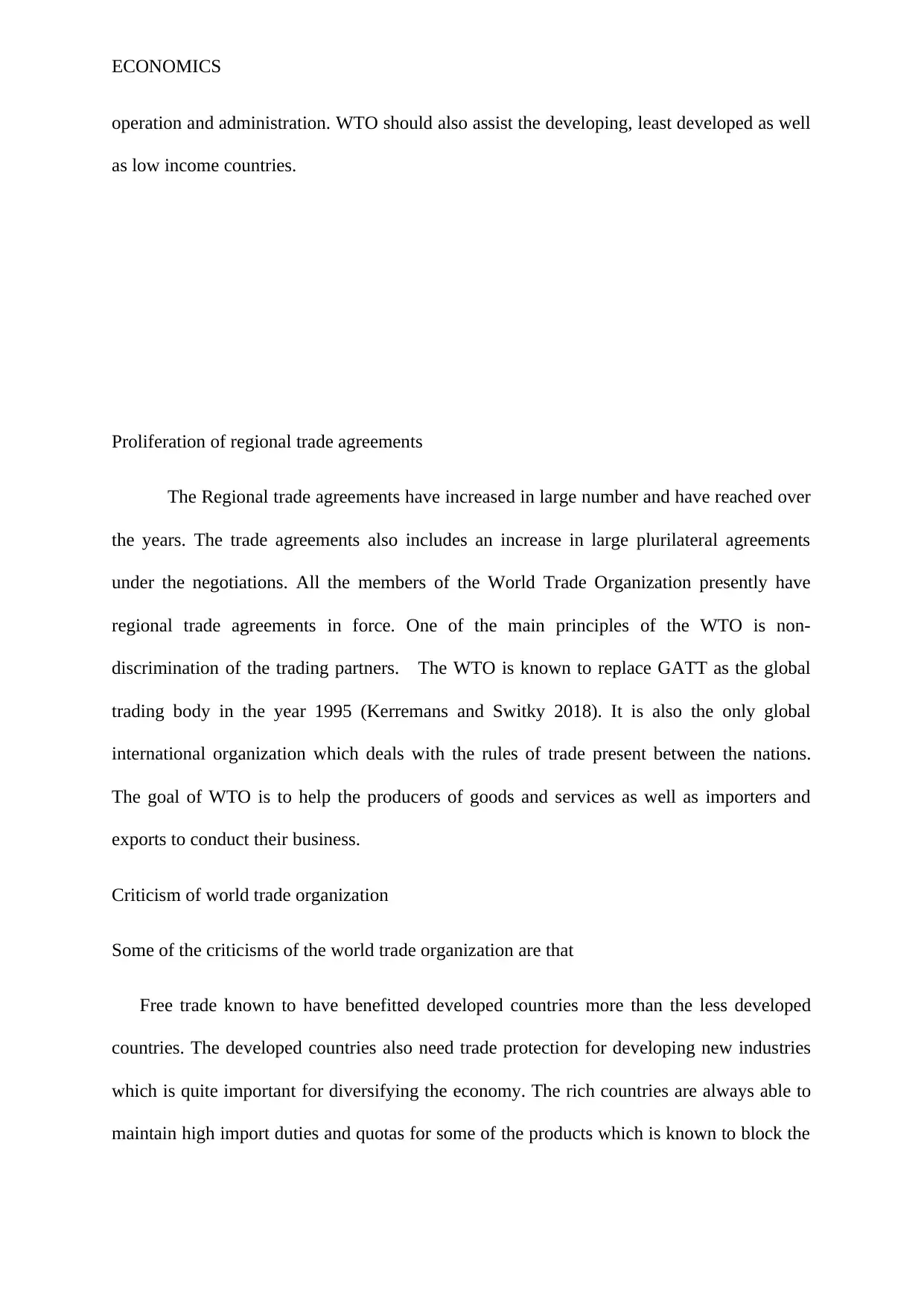
ECONOMICS
operation and administration. WTO should also assist the developing, least developed as well
as low income countries.
Proliferation of regional trade agreements
The Regional trade agreements have increased in large number and have reached over
the years. The trade agreements also includes an increase in large plurilateral agreements
under the negotiations. All the members of the World Trade Organization presently have
regional trade agreements in force. One of the main principles of the WTO is non-
discrimination of the trading partners. The WTO is known to replace GATT as the global
trading body in the year 1995 (Kerremans and Switky 2018). It is also the only global
international organization which deals with the rules of trade present between the nations.
The goal of WTO is to help the producers of goods and services as well as importers and
exports to conduct their business.
Criticism of world trade organization
Some of the criticisms of the world trade organization are that
Free trade known to have benefitted developed countries more than the less developed
countries. The developed countries also need trade protection for developing new industries
which is quite important for diversifying the economy. The rich countries are always able to
maintain high import duties and quotas for some of the products which is known to block the
operation and administration. WTO should also assist the developing, least developed as well
as low income countries.
Proliferation of regional trade agreements
The Regional trade agreements have increased in large number and have reached over
the years. The trade agreements also includes an increase in large plurilateral agreements
under the negotiations. All the members of the World Trade Organization presently have
regional trade agreements in force. One of the main principles of the WTO is non-
discrimination of the trading partners. The WTO is known to replace GATT as the global
trading body in the year 1995 (Kerremans and Switky 2018). It is also the only global
international organization which deals with the rules of trade present between the nations.
The goal of WTO is to help the producers of goods and services as well as importers and
exports to conduct their business.
Criticism of world trade organization
Some of the criticisms of the world trade organization are that
Free trade known to have benefitted developed countries more than the less developed
countries. The developed countries also need trade protection for developing new industries
which is quite important for diversifying the economy. The rich countries are always able to
maintain high import duties and quotas for some of the products which is known to block the
Paraphrase This Document
Need a fresh take? Get an instant paraphrase of this document with our AI Paraphraser
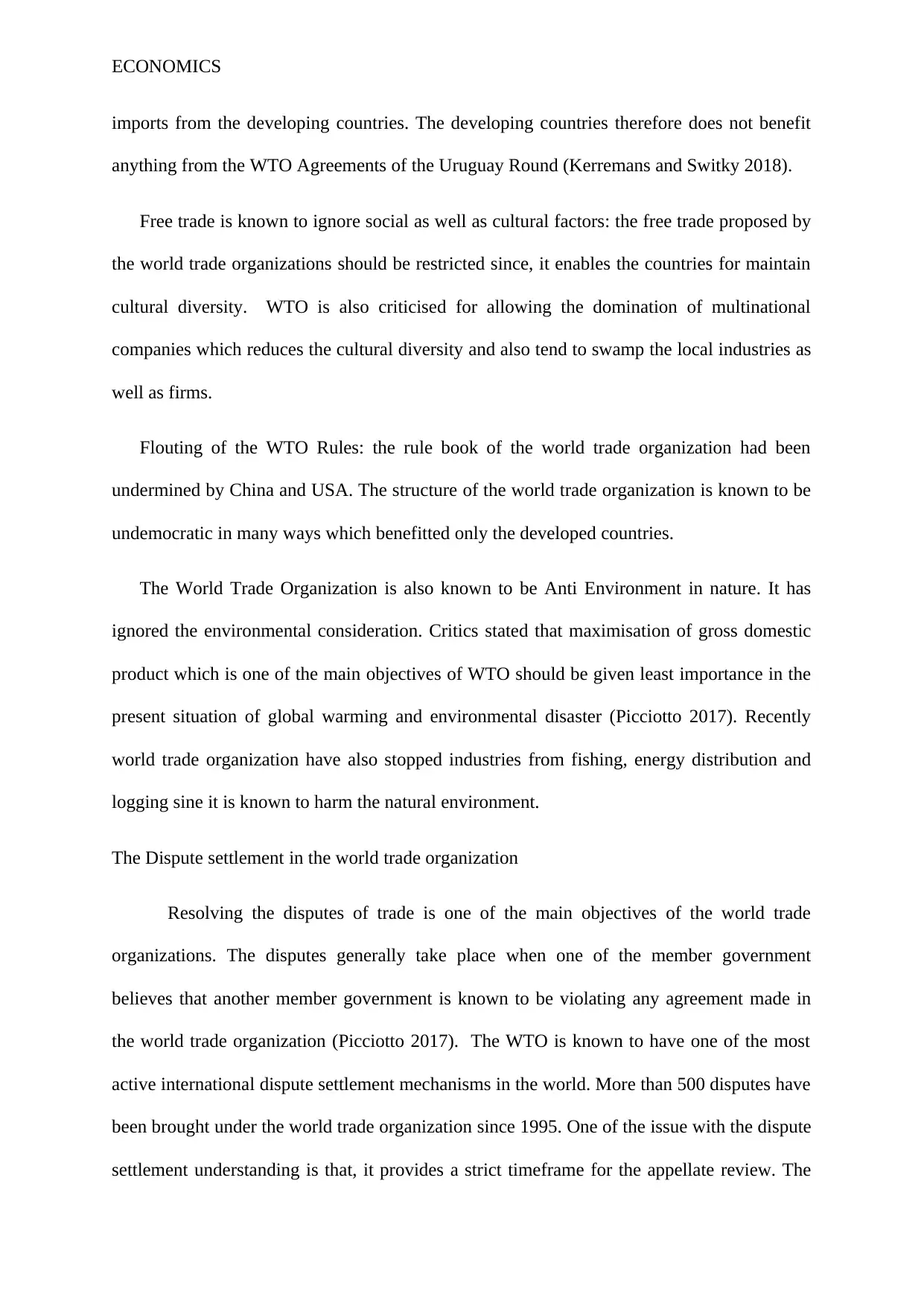
ECONOMICS
imports from the developing countries. The developing countries therefore does not benefit
anything from the WTO Agreements of the Uruguay Round (Kerremans and Switky 2018).
Free trade is known to ignore social as well as cultural factors: the free trade proposed by
the world trade organizations should be restricted since, it enables the countries for maintain
cultural diversity. WTO is also criticised for allowing the domination of multinational
companies which reduces the cultural diversity and also tend to swamp the local industries as
well as firms.
Flouting of the WTO Rules: the rule book of the world trade organization had been
undermined by China and USA. The structure of the world trade organization is known to be
undemocratic in many ways which benefitted only the developed countries.
The World Trade Organization is also known to be Anti Environment in nature. It has
ignored the environmental consideration. Critics stated that maximisation of gross domestic
product which is one of the main objectives of WTO should be given least importance in the
present situation of global warming and environmental disaster (Picciotto 2017). Recently
world trade organization have also stopped industries from fishing, energy distribution and
logging sine it is known to harm the natural environment.
The Dispute settlement in the world trade organization
Resolving the disputes of trade is one of the main objectives of the world trade
organizations. The disputes generally take place when one of the member government
believes that another member government is known to be violating any agreement made in
the world trade organization (Picciotto 2017). The WTO is known to have one of the most
active international dispute settlement mechanisms in the world. More than 500 disputes have
been brought under the world trade organization since 1995. One of the issue with the dispute
settlement understanding is that, it provides a strict timeframe for the appellate review. The
imports from the developing countries. The developing countries therefore does not benefit
anything from the WTO Agreements of the Uruguay Round (Kerremans and Switky 2018).
Free trade is known to ignore social as well as cultural factors: the free trade proposed by
the world trade organizations should be restricted since, it enables the countries for maintain
cultural diversity. WTO is also criticised for allowing the domination of multinational
companies which reduces the cultural diversity and also tend to swamp the local industries as
well as firms.
Flouting of the WTO Rules: the rule book of the world trade organization had been
undermined by China and USA. The structure of the world trade organization is known to be
undemocratic in many ways which benefitted only the developed countries.
The World Trade Organization is also known to be Anti Environment in nature. It has
ignored the environmental consideration. Critics stated that maximisation of gross domestic
product which is one of the main objectives of WTO should be given least importance in the
present situation of global warming and environmental disaster (Picciotto 2017). Recently
world trade organization have also stopped industries from fishing, energy distribution and
logging sine it is known to harm the natural environment.
The Dispute settlement in the world trade organization
Resolving the disputes of trade is one of the main objectives of the world trade
organizations. The disputes generally take place when one of the member government
believes that another member government is known to be violating any agreement made in
the world trade organization (Picciotto 2017). The WTO is known to have one of the most
active international dispute settlement mechanisms in the world. More than 500 disputes have
been brought under the world trade organization since 1995. One of the issue with the dispute
settlement understanding is that, it provides a strict timeframe for the appellate review. The
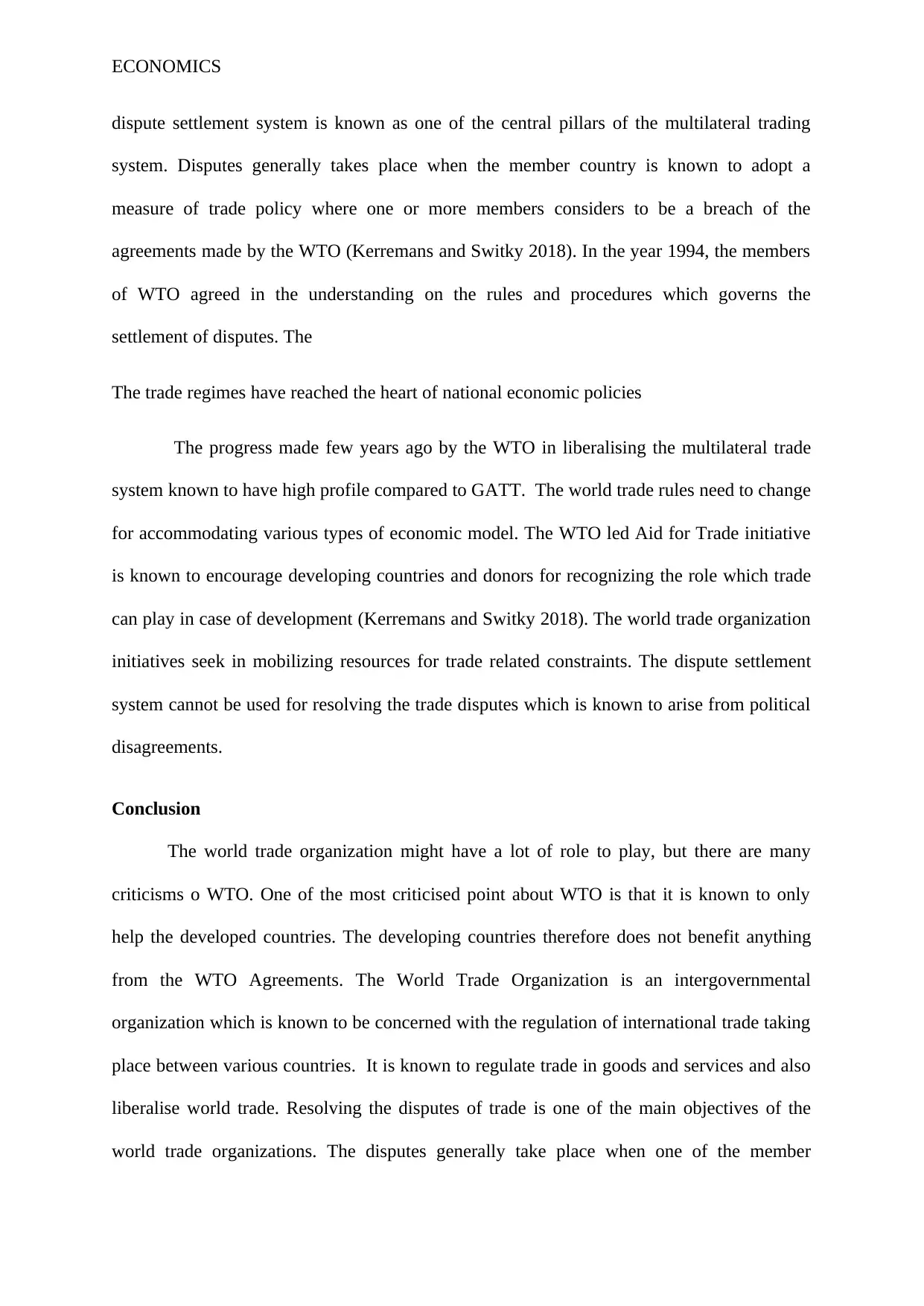
ECONOMICS
dispute settlement system is known as one of the central pillars of the multilateral trading
system. Disputes generally takes place when the member country is known to adopt a
measure of trade policy where one or more members considers to be a breach of the
agreements made by the WTO (Kerremans and Switky 2018). In the year 1994, the members
of WTO agreed in the understanding on the rules and procedures which governs the
settlement of disputes. The
The trade regimes have reached the heart of national economic policies
The progress made few years ago by the WTO in liberalising the multilateral trade
system known to have high profile compared to GATT. The world trade rules need to change
for accommodating various types of economic model. The WTO led Aid for Trade initiative
is known to encourage developing countries and donors for recognizing the role which trade
can play in case of development (Kerremans and Switky 2018). The world trade organization
initiatives seek in mobilizing resources for trade related constraints. The dispute settlement
system cannot be used for resolving the trade disputes which is known to arise from political
disagreements.
Conclusion
The world trade organization might have a lot of role to play, but there are many
criticisms o WTO. One of the most criticised point about WTO is that it is known to only
help the developed countries. The developing countries therefore does not benefit anything
from the WTO Agreements. The World Trade Organization is an intergovernmental
organization which is known to be concerned with the regulation of international trade taking
place between various countries. It is known to regulate trade in goods and services and also
liberalise world trade. Resolving the disputes of trade is one of the main objectives of the
world trade organizations. The disputes generally take place when one of the member
dispute settlement system is known as one of the central pillars of the multilateral trading
system. Disputes generally takes place when the member country is known to adopt a
measure of trade policy where one or more members considers to be a breach of the
agreements made by the WTO (Kerremans and Switky 2018). In the year 1994, the members
of WTO agreed in the understanding on the rules and procedures which governs the
settlement of disputes. The
The trade regimes have reached the heart of national economic policies
The progress made few years ago by the WTO in liberalising the multilateral trade
system known to have high profile compared to GATT. The world trade rules need to change
for accommodating various types of economic model. The WTO led Aid for Trade initiative
is known to encourage developing countries and donors for recognizing the role which trade
can play in case of development (Kerremans and Switky 2018). The world trade organization
initiatives seek in mobilizing resources for trade related constraints. The dispute settlement
system cannot be used for resolving the trade disputes which is known to arise from political
disagreements.
Conclusion
The world trade organization might have a lot of role to play, but there are many
criticisms o WTO. One of the most criticised point about WTO is that it is known to only
help the developed countries. The developing countries therefore does not benefit anything
from the WTO Agreements. The World Trade Organization is an intergovernmental
organization which is known to be concerned with the regulation of international trade taking
place between various countries. It is known to regulate trade in goods and services and also
liberalise world trade. Resolving the disputes of trade is one of the main objectives of the
world trade organizations. The disputes generally take place when one of the member
⊘ This is a preview!⊘
Do you want full access?
Subscribe today to unlock all pages.

Trusted by 1+ million students worldwide
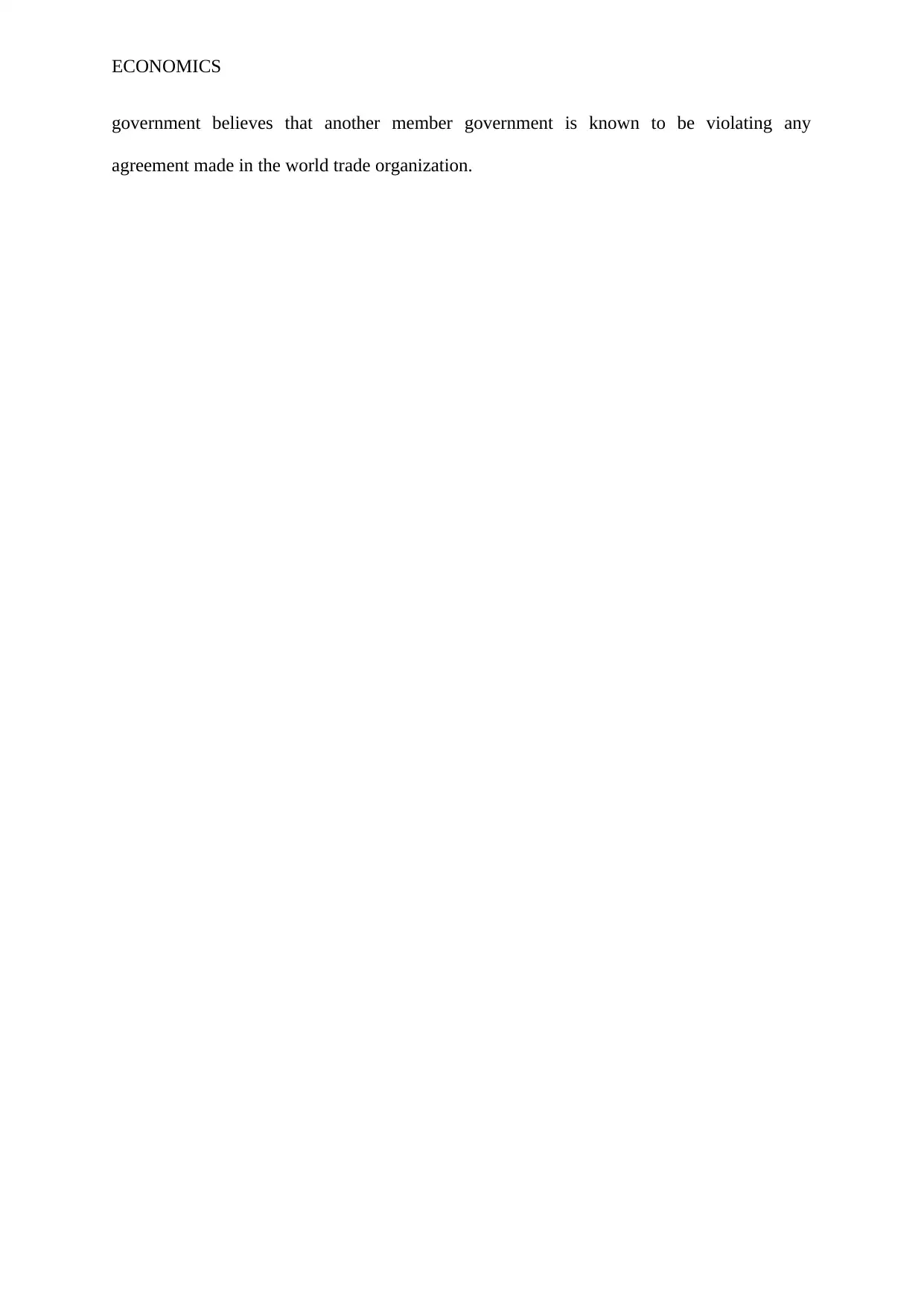
ECONOMICS
government believes that another member government is known to be violating any
agreement made in the world trade organization.
government believes that another member government is known to be violating any
agreement made in the world trade organization.
Paraphrase This Document
Need a fresh take? Get an instant paraphrase of this document with our AI Paraphraser
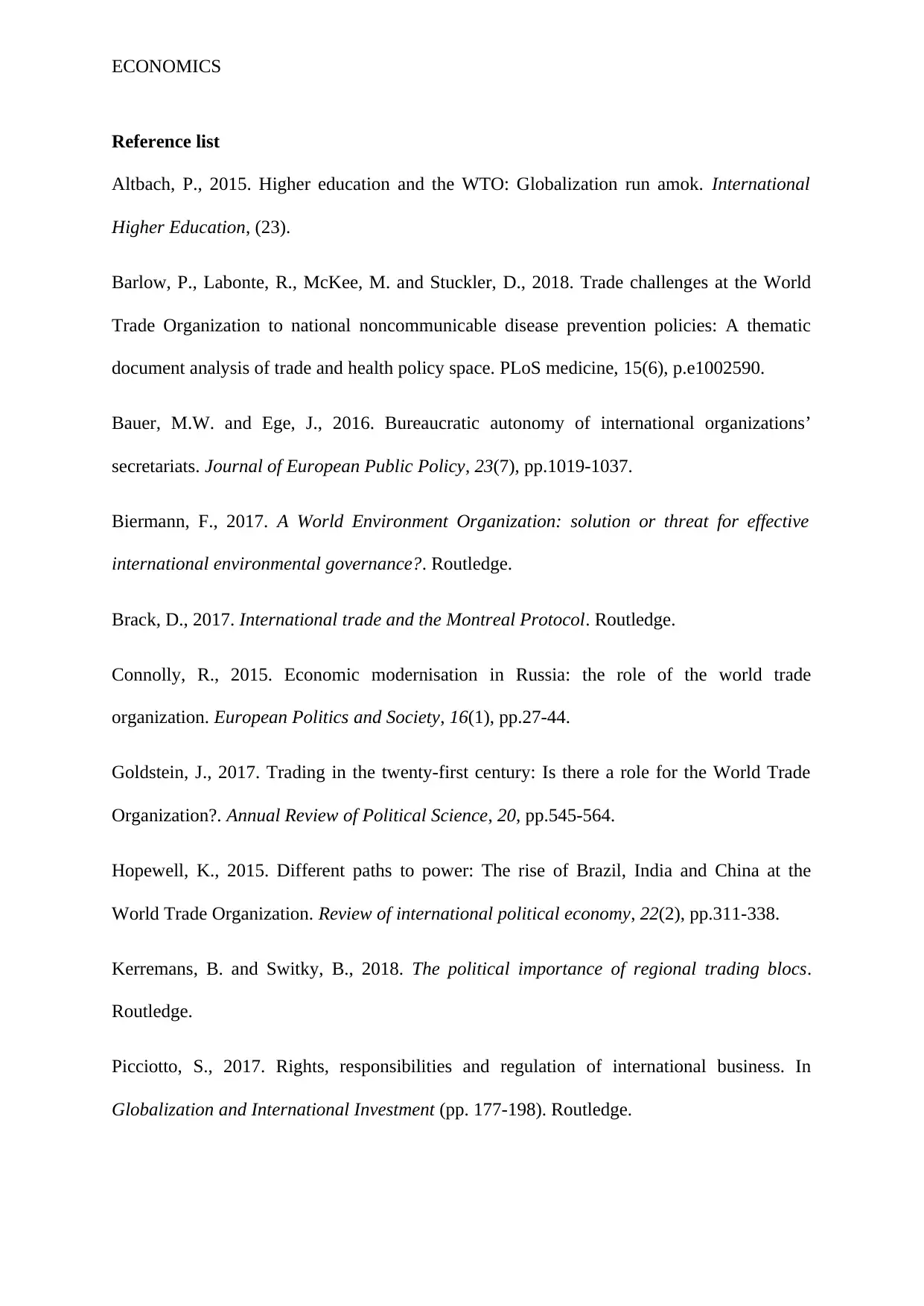
ECONOMICS
Reference list
Altbach, P., 2015. Higher education and the WTO: Globalization run amok. International
Higher Education, (23).
Barlow, P., Labonte, R., McKee, M. and Stuckler, D., 2018. Trade challenges at the World
Trade Organization to national noncommunicable disease prevention policies: A thematic
document analysis of trade and health policy space. PLoS medicine, 15(6), p.e1002590.
Bauer, M.W. and Ege, J., 2016. Bureaucratic autonomy of international organizations’
secretariats. Journal of European Public Policy, 23(7), pp.1019-1037.
Biermann, F., 2017. A World Environment Organization: solution or threat for effective
international environmental governance?. Routledge.
Brack, D., 2017. International trade and the Montreal Protocol. Routledge.
Connolly, R., 2015. Economic modernisation in Russia: the role of the world trade
organization. European Politics and Society, 16(1), pp.27-44.
Goldstein, J., 2017. Trading in the twenty-first century: Is there a role for the World Trade
Organization?. Annual Review of Political Science, 20, pp.545-564.
Hopewell, K., 2015. Different paths to power: The rise of Brazil, India and China at the
World Trade Organization. Review of international political economy, 22(2), pp.311-338.
Kerremans, B. and Switky, B., 2018. The political importance of regional trading blocs.
Routledge.
Picciotto, S., 2017. Rights, responsibilities and regulation of international business. In
Globalization and International Investment (pp. 177-198). Routledge.
Reference list
Altbach, P., 2015. Higher education and the WTO: Globalization run amok. International
Higher Education, (23).
Barlow, P., Labonte, R., McKee, M. and Stuckler, D., 2018. Trade challenges at the World
Trade Organization to national noncommunicable disease prevention policies: A thematic
document analysis of trade and health policy space. PLoS medicine, 15(6), p.e1002590.
Bauer, M.W. and Ege, J., 2016. Bureaucratic autonomy of international organizations’
secretariats. Journal of European Public Policy, 23(7), pp.1019-1037.
Biermann, F., 2017. A World Environment Organization: solution or threat for effective
international environmental governance?. Routledge.
Brack, D., 2017. International trade and the Montreal Protocol. Routledge.
Connolly, R., 2015. Economic modernisation in Russia: the role of the world trade
organization. European Politics and Society, 16(1), pp.27-44.
Goldstein, J., 2017. Trading in the twenty-first century: Is there a role for the World Trade
Organization?. Annual Review of Political Science, 20, pp.545-564.
Hopewell, K., 2015. Different paths to power: The rise of Brazil, India and China at the
World Trade Organization. Review of international political economy, 22(2), pp.311-338.
Kerremans, B. and Switky, B., 2018. The political importance of regional trading blocs.
Routledge.
Picciotto, S., 2017. Rights, responsibilities and regulation of international business. In
Globalization and International Investment (pp. 177-198). Routledge.
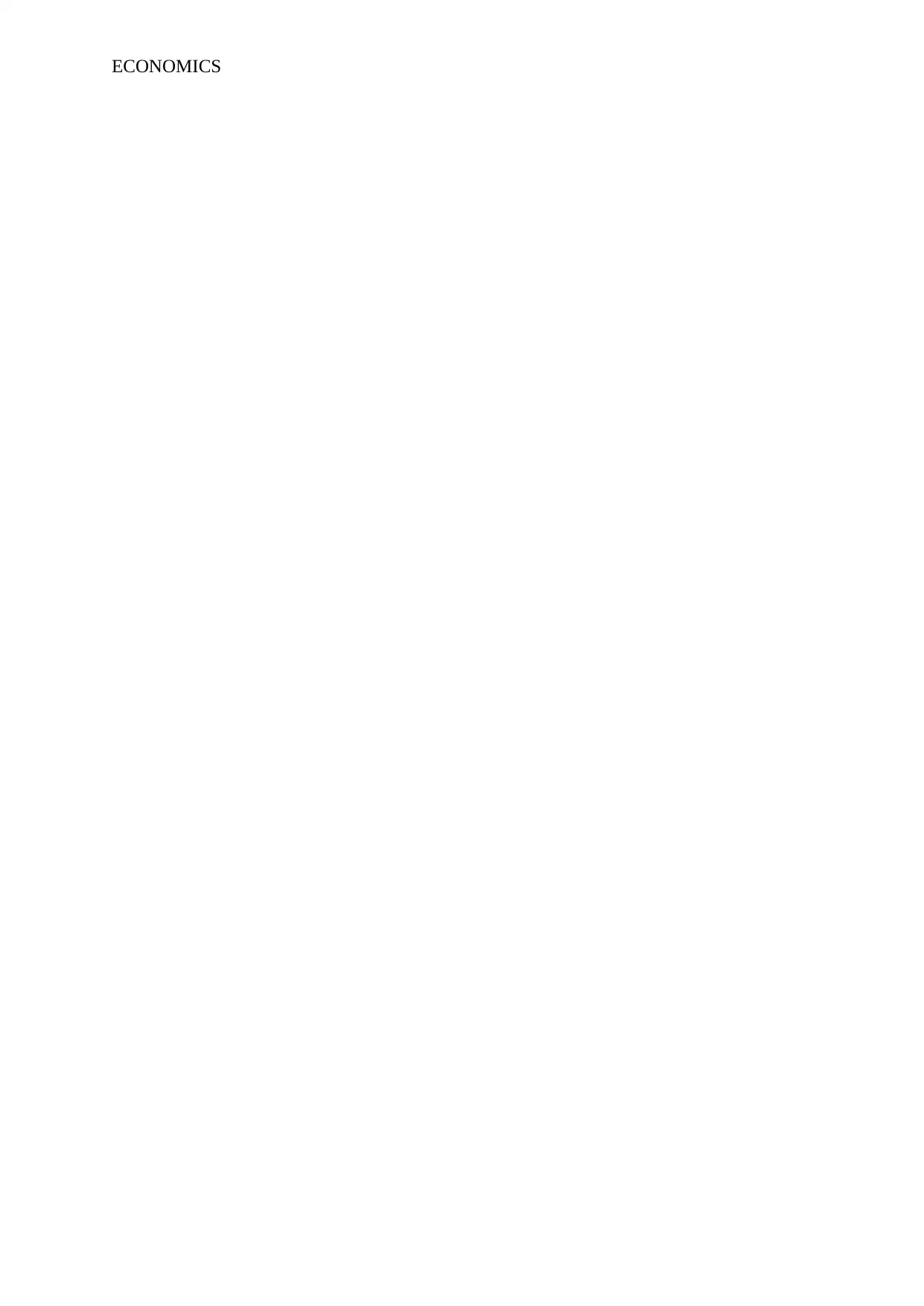
ECONOMICS
⊘ This is a preview!⊘
Do you want full access?
Subscribe today to unlock all pages.

Trusted by 1+ million students worldwide
1 out of 9
Related Documents
Your All-in-One AI-Powered Toolkit for Academic Success.
+13062052269
info@desklib.com
Available 24*7 on WhatsApp / Email
![[object Object]](/_next/static/media/star-bottom.7253800d.svg)
Unlock your academic potential
Copyright © 2020–2026 A2Z Services. All Rights Reserved. Developed and managed by ZUCOL.




